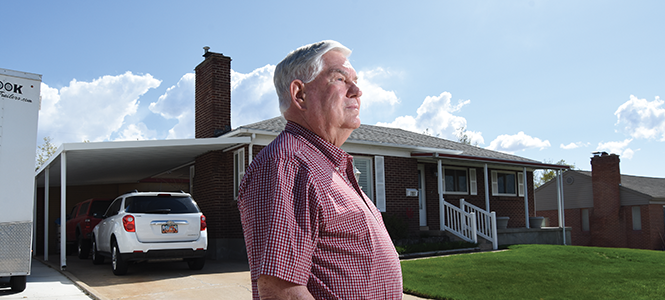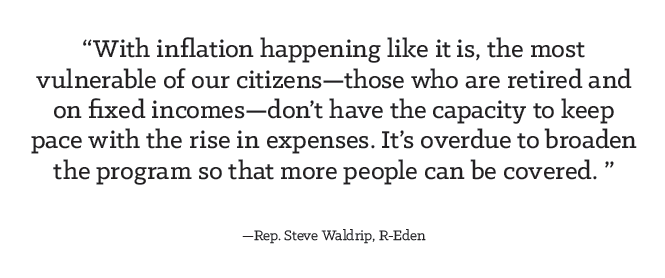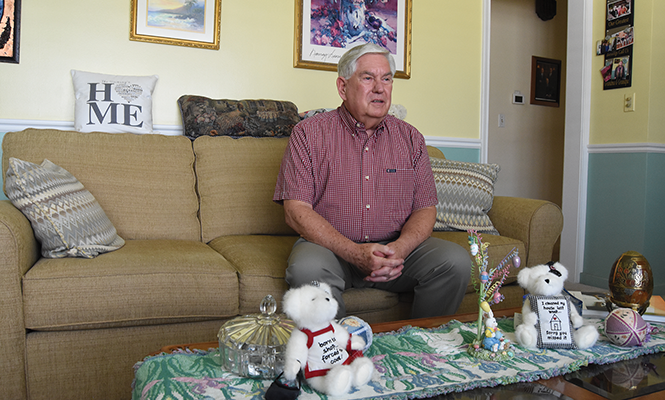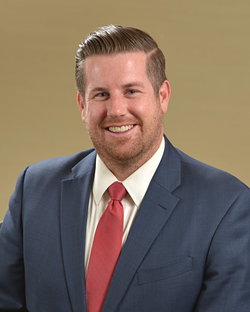
- Ben Tecumseh DeSoto
- Duane Sjoberg, 81, poses on the driveway of his home, which he bought in unincorporated Davis County more than 50 years ago.
The following story was supported by funding from The Economic Hardship Reporting Project and was reported by The Utah Investigative Journalism Project in partnership with City Weekly, The Spectrum & Daily News, Daily Herald, Standard Examiner, The Park Record and Living and Aging With Pride.
Property taxes on the dream home Darrell Stanley built in Midway eight years ago have spiked. And while he and his wife own the home outright, rising costs are now threatening the housing and retirement he worked so hard to secure.
"From 2019 until 2021, my property taxes went up 70 percent," said the 65-year-old retired commercial pilot, whose pension shrunk after the airline he worked for declared bankruptcy. In one year alone, his tax bill increased from $7,700 to $9,700 because his home's assessed market value went up about $300,000.
"I'm on a fixed income now and can't afford to have my property taxes going up like this every year," Stanley said, noting that he worked hard for 30 to 40 years to make his Midway home a reality.
He said he fears it could reach the point where "I can't afford it anymore and will have to move out."
Stanley was excited to learn of one program that might offer some relief—a decades-old tax relief program known as "Circuit Breaker." It's geared for low-income homeowners and renters in Utah who are 66 years of age and older. Recently, critics have noted that this program could be helping many, but remains underutilized, primarily because most Utah seniors don't even know about it.
Tim Funk, a low-income housing policy advocate for Crossroads Urban Center in Salt Lake City, referred to the Circuit Breaker program as a "golden secret," especially for seniors who don't actively use computers and are trying to navigate the application process.
"Economically, these are people on fixed incomes who have little or no recourse," Funk told a group of low-income advocates recently. "This program—if it could pay them $300 to $500 on average, especially if they were renters—would be golden to them and make all of us feel a lot better."
County-by-county data gathered by legislative researchers in 2021 showed that Salt Lake County—Utah's most populous county at more than 1.1 million residents as of April 2020—led the way in use of the program, with 2,578 qualifying homeowners claiming the Circuit Breaker tax credit. But rural Daggett County—with a population of just 935 in 2020—logged just one Circuit Breaker recipient that year.
Across the state, a tiny percentage of seniors—fewer than 1%—are using the program.
—Washington County: With 21% of the population 65 and older, only 0.54% were enrolled.
—Weber County: With 12% of the population 65 and older only, 0.35% were enrolled.
—Davis County: With 10% of the population 65 and older, only 0.24% were enrolled.
—Salt Lake County: With 11% of the population 65 and older, only 0.22% were enrolled.
—Utah County: With 8% of the population 65 and older, only 0.14% were enrolled.
Currently, the Circuit Breaker program is hampered by lack of resources for outreach and differing administration across 29 individual counties.
The program has also suffered at the state level from lack of promotion and a recently defeated attempt in the Legislature to increase participant income caps.
Breaking It Down
Under Circuit Breaker, Utah senior homeowners with annual household incomes less than $35,807 (in 2021) can receive a property tax credit on their state income tax return.
The sliding-scale program allows a credit of $1,110 for households making $12,173 or less, and that amount shrinks to $179 when household income rises to between $32,226 and $35,807.
Those income caps adjust annually to keep pace with the rate of inflation.
Utah's 29 counties are individually tasked with administering the Circuit Breaker homeowners credit, because they routinely assess property values and send out valuation notices each year.
But the Utah State Tax Commission oversees a renters' tax credit that's also part of Circuit Breaker. The same income caps apply, along with a similar sliding scale where those at the bottom can receive more than $1,000 back if they file an annual income tax return.
According to informational materials released by the tax commission, unmarried surviving spouses of seniors who would have qualified for the credits can also qualify, regardless of age.
Numbers provided by the state tax commission show that 6,583 homeowners statewide tapped the Circuit Breaker program in 2021, for a total cash payout of almost $3.6 million. Those figures dropped from 12,094 homeowners in 2016, when qualified applicants received almost $4.9 million combined. Meanwhile, some 2,780 renters claimed credits totaling $891,090 in 2020.
Jason Gardner, legislative affairs director for the tax commission, said the agency had no numbers tracking actual eligibility for Circuit Breaker.

But Funk—who said he's helped individuals apply for the program—believes the pool of qualified applicants could be triple the number who actually tap the benefit.
"Better than half the people who are eligible are not being very well served," Funk told community advocates during an April Zoom session. He suggested forming a group that would challenge the state to improve outreach regarding Circuit Breaker.
Recent U.S. Census data estimated Utah's 2021 population at roughly 3.3 million, with approximately 380,000 people who are age 65 and up. And about 244,000 individuals in the state live in poverty.
In 2021, the federal poverty level was $12,880 for a single Utah resident and $26,500 for a family of four.
Money Pit
Duane Sjoberg, age 81, recently found out about Utah's Circuit Breaker program through tax-aide volunteers who work with seniors through AARP of Utah. Sjoberg, a retired mechanical engineer, said he's lived in his home in unincorporated Davis County for more than 50 years.
"We want to stay in our home," Sjoberg said, noting that the 1,100-square-foot structure still suits his needs even though certain things are becoming more of a chore, such as "seven fruit trees that need to be pruned and tended and a swimming pool that needs lots of attention."
Now, homes like his are selling for more than $400,000, Sjoberg said (the Zillow estimate for his address: $470,000), and property taxes have risen accordingly. But his fixed income has not.

- Ben Tecumseh DeSoto
- “We want to stay in our home,” says Duane Sjoberg, whose monthly escrow payment for property taxes is greater than his mortgage.
After looking into the Circuit Breaker option, Sjoberg felt it wouldn't do much for him. So he's checking out the state's new tax deferral program instead.
"It wouldn't be a problem to qualify for that," Sjoberg said.
In the meantime, he sets aside $225 per month in escrow to cover his annual property tax bill—which he said now totals more than he used to shell each month out for his mortgage payment.
Sjoberg may have benefited more from Circuit Breaker had it gotten a boost in the recent 2022 legislative session. Rep. Steve Waldrip—R-Eden—unsuccessfully ran a bill that would have almost doubled the income caps for Circuit Breaker.
If HB401 had cleared both chambers, it would have lifted those household income caps to $22,173 on the lower end (to receive the maximum credit) and the upper limit would top out at $45,807.
Waldrip's measure cleared the House with a unanimous vote but failed to come up for debate in the Senate before the final gavel fell on March 4. And while he said he planned to give the legislation another try in 2023, he recently announced that he was dropping his bid for reelection.
"I am concerned that with inflation happening like it is, the most vulnerable of our citizens—those who are retired and on fixed incomes—don't have the capacity to keep pace with the rise in expenses," Waldrip said. "It's overdue to broaden the program so that more people can be covered—and to increase the amounts that they're eligible for."
Lawmakers did approve another bill this year, SB25, which allows a tax deferral to homeowners age 75 and up who have household incomes that extend up to twice the amount of the Circuit Breaker cap. But when the individual's home changes hands, the delayed taxes must be reimbursed with interest.
Without dedicated marketing budgets, county officials say they're limited in what they can do to spread the word about property tax relief programs, Circuit Breaker among them.
In Salt Lake County, that means posting information about the Circuit Breaker's homeowners tax relief on its website, printing information about all the property tax relief programs on valuation notices that go out each July, visiting area senior centers and senior expos and also reaching out to local media outlets to spread the word.
But the COVID-19 pandemic put a two-year kink in most in-person activity.
Joy Hayes, tax relief supervisor in the Salt Lake County Treasurer's Office, said she had hoped that Waldrip's bill to raise income caps would pass this year.
"When I go to the senior centers and talk to them, I hear that the income limit is really low," Hayes said. "And due to the tough economy, a lot of people have their kids living with them. So because the program is based on total household income, they no longer qualify."
Weber County Clerk Auditor Ricky Hatch described various complications that arise.
"There are instances where several people live in a house. Because of how it's calculated, we have to count the income of other (adult) household members too," Hatch said. "And there are some instances where if they own assets in another area, they can't qualify when in fact those assets might not be convertible. There's a whole bunch of complex things that make it not quite as easy."
But anyone who qualified in the past automatically receives a reminder to apply again, Hatch said. And when county officials across the state gather for trainings and conferences, Hatch said Circuit Breaker comes up "quite a bit."
"But I don't recall having a discussion about how we can better get the word out so that people are aware," Hatch said. "That's probably something we should do."
Davis County aims to be as proactive as possible, Clerk Auditor Curtis Koch said. Its tax administrators meet with senior center staff and attendees, and they also distribute rack cards with key information about tax relief programs to libraries and city offices throughout the county.
In Utah County, Burt Harvey—division manager for public services and tax administration—expressed frustration about the inability to reach those who could truly benefit from Circuit Breaker. He said the office simply lacks the time and staff.
"We don't have the resources to go out to the various senior centers and maybe set up times to meet with seniors. The county hasn't funded that," Harvey said. "I have one person who processes applications and determines if people qualify. With the workload, there's no way she could even spend one day out of the office."
However, state law does allow leeway in the application deadline, so Harvey said counties often accept applications up until Dec. 31, which is the hard cutoff date.
Keri Pallesen doubles as human resource director and auditor for sparsely populated Daggett County—home to Flaming Gorge Reservoir. For this remote county, the back of the valuation notice serves as the main source of all tax relief information.
"We do have a senior center. I've gone there on occasion but not to talk about Circuit Breaker. But I might consider doing it," Pallesen said. "Any time we can let our citizens know about a program, it's good."
Making Rent
The state tax commission publishes information about Circuit Breaker on its website, but that's the extent of Utah's renter relief outreach—again due to lack of resources.
"We don't really have an advertising budget," said Gardner, the agency's legislative affairs director. "That's not our business to a great degree."
Gardner credited organizations such as AARP for picking up the slack. He also suggested that the Utah Department of Workforce Services, which regularly interfaces with people who could benefit from Circuit Breaker, could perhaps incorporate renters' relief into their current framework.
When contacted about Circuit Breaker, DWS spokeswoman Christina Davis said this was the first she'd personally heard of the program.
"As far as that kind of need goes, we're pretty focused on connecting people with heat, and we also have rental-assistance programs that are part of the pandemic response," Davis said. "We're certainly happy to help spread the word about Circuit Breaker."
Steve Erickson, a consultant for both the Crossroads Urban Center and Utah's chapter of the National Association of Housing and Redevelopment Officials (NAHRO), said he began working with the state's housing authorities in the fall of 2021 to spread the word about Circuit Breaker's renter-relief program. He also put together a one-page fact sheet that could be distributed or posted in offices.
"The renters' rebate is not widely known ... and $1,000 for a low-income senior household could be a real game changer," Erickson said.

- Courtesy
- AARP of Utah’s Danny Harris says more Utahns are feeling the pinch of rising property taxes.
Danny Harris, advocacy director for AARP Utah, said that underutilization of Circuit Breaker also concerns his organization.
"One of our biggest priorities is to make sure that people have the opportunity to stay in their homes for as long as possible," Harris said, "and that they have the tools and resources to live independently."
Part of his role lies in supporting favorable legislation on Utah's Capitol Hill. Recently, that included Waldrip's stalled bill and the successful tax-deferral measure that requires paying the credits back when homes get sold.
"We're paying more and more attention to this as property taxes increase, and it's becoming more of a challenge for people," Harris said.
Dave Moore works as a training resource specialist for AARP-Utah's volunteer Tax-Aide division.
"Part of the [reason] Circuit Breaker is underutilized is that people don't know about it," Moore said. "But the other part is that Circuit Breaker is not simple to apply for, especially if you're elderly and not computer savvy."
Linda Oram, state coordinator of Tax-Aide, also described other limitations. "We have 24 sites statewide, each one staffed with two to 12 preparers (105 total)," Oram said. These trained and certified volunteers work with clients in rent-free spaces such as libraries and senior centers.
"Generally, all our sites that take reservations fill up weeks in advance. Our sites for walk-ins generally fill up within the first hour of the day," Moore said. "There's a huge demand for free tax-preparation help."
But Moore aims to expand Circuit Breaker's reach.
"Our state end-of-season manager meeting is next week," Moore said. "I'm going to send up a trial balloon to ask if we want to host one or two days next fall where we'll bring in our laptops and offer to help people at the same sites we do [income] taxes to actually do their applications for Circuit Breaker."
The IRS also offers no-cost tax-preparation services to individuals who qualify through its Volunteer Income Tax Assistance (VITA) and Tax Counseling for the Elderly (TCE) programs.
Koch (Davis County's clerk auditor) described why he's a fierce advocate of the Circuit Breaker program.
"If we don't take care of people, we start to fail as a society. Keeping people in their homes has to be a priority," Koch said "These folks have worked hard to have homeownership ... so keeping them (there) when hard times come gives them the opportunity to move forward."
Counties do get reimbursed after the fact for tax-relief credits, the tax commission's Gardner said, adding that Circuit Breaker homeowners also receive a 20% reduction in the taxable values of their properties.
"The reduction in value comes out of the county's budget," Gardner said. "The majority comes from the state's general fund."
And Utah County's Harvey noted the "donut hole" that exists for very low-income renters who could benefit from Circuit Breaker but do not make enough to require filing income tax returns.
"Those are the [people] least likely to reach out to us and also the least likely that I would have direct access to," Harvey said.
Send feedback to comments@cityweekly.net
"Short" - Google News
May 05, 2022 at 12:03AM
https://ift.tt/85gdIrh
Short Circuit - Salt Lake City Weekly
"Short" - Google News
https://ift.tt/lsjAJKS
Bagikan Berita Ini















0 Response to "Short Circuit - Salt Lake City Weekly"
Post a Comment